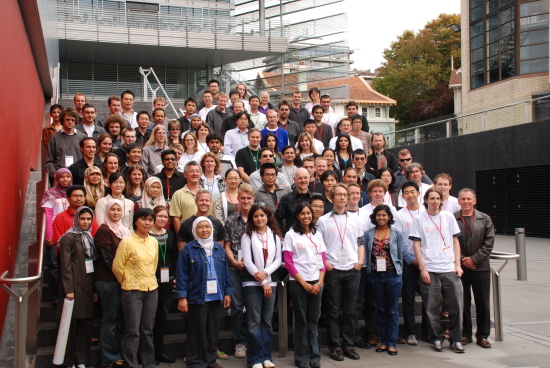New Zealand Computer Science Research Students Conference
18 May 2009 - 09:38:58 in Event
 During the mid-trimester break in April, seven students from ECS
(Keith Cassell, Adam Clarke, Rashina Hoda, Ben Palmer, Kourosh
Neshatian, Kok-Lim.Yau, and Craig Anslow) attended the New Zealand
Computer Science Research Students Conference (NZCSRSC) at Auckland
University. The Conference, which is in its 7th year, is organised
and run by postgraduate students, and aims to promote and strengthen
the nationwide community of ICT research students.
Key note speakers included former Victoria University masters student
Alan Blackwell, who gave an insight into Interdisciplinary Design
Research for Interactive Technology. As Alan, who is now at Cambridge
University, states on his home page "I only have one big research
question, but I attack it from a lot of different angles. The question
is representation. How do people make, see and use things that carry
meaning? The angles from which I attack my question include various
ways in which representations are applied (including design processes,
interacting with technology, computer programming, visualisation),
various methods by which I collect research data (including controlled
experiments, prototype construction, ethnographic observation), and
the theoretical perspectives of various academic disciplines
(including computer science, cognitive psychology, engineering,
architecture, music, anthropology)" (http://www.cl.cam.ac.uk/~afb21/research.html
).
Another key note speaker, J.P. Lewis from Weta Digital, used the movie
King Kong to illustrate Why Academic Research Matters to Weta Digital.
Specifically the presentation looked at the graphic techniques used to
recreate the city of New York in 1920 and the realistic skin, fur,
eyes and movement of Kong.
A core component of the annual Conference are the presentations and
posters from students. This year 25 graduates studying at New Zealand
universities (and 7 from ECS) gave presentations and as in previous
years the standard of talks and posters were of high quality. A range
of workshops also gave students the opportunity to build on their
research skills and topics ranged from thesis writing, time
management, presentation skills, the publication game, to discussions
on careers in research and the industry in general.
The conference not only gave student researchers an understanding of
what others are doing, but also gave them the opportunity to interact
with others who are motivated and passionate about their work. But it
wasn't all work, highlights of the conference included the Endace
opening dinner and the Orion Health social night that involved a
boat cruise on Auckland harbour.
Feedback from the students who attended was positive - "The organisers
did a fantastic job in planning the conference which ran very
smoothly. We are looking forward to next years conference".
During the mid-trimester break in April, seven students from ECS
(Keith Cassell, Adam Clarke, Rashina Hoda, Ben Palmer, Kourosh
Neshatian, Kok-Lim.Yau, and Craig Anslow) attended the New Zealand
Computer Science Research Students Conference (NZCSRSC) at Auckland
University. The Conference, which is in its 7th year, is organised
and run by postgraduate students, and aims to promote and strengthen
the nationwide community of ICT research students.
Key note speakers included former Victoria University masters student
Alan Blackwell, who gave an insight into Interdisciplinary Design
Research for Interactive Technology. As Alan, who is now at Cambridge
University, states on his home page "I only have one big research
question, but I attack it from a lot of different angles. The question
is representation. How do people make, see and use things that carry
meaning? The angles from which I attack my question include various
ways in which representations are applied (including design processes,
interacting with technology, computer programming, visualisation),
various methods by which I collect research data (including controlled
experiments, prototype construction, ethnographic observation), and
the theoretical perspectives of various academic disciplines
(including computer science, cognitive psychology, engineering,
architecture, music, anthropology)" (http://www.cl.cam.ac.uk/~afb21/research.html
).
Another key note speaker, J.P. Lewis from Weta Digital, used the movie
King Kong to illustrate Why Academic Research Matters to Weta Digital.
Specifically the presentation looked at the graphic techniques used to
recreate the city of New York in 1920 and the realistic skin, fur,
eyes and movement of Kong.
A core component of the annual Conference are the presentations and
posters from students. This year 25 graduates studying at New Zealand
universities (and 7 from ECS) gave presentations and as in previous
years the standard of talks and posters were of high quality. A range
of workshops also gave students the opportunity to build on their
research skills and topics ranged from thesis writing, time
management, presentation skills, the publication game, to discussions
on careers in research and the industry in general.
The conference not only gave student researchers an understanding of
what others are doing, but also gave them the opportunity to interact
with others who are motivated and passionate about their work. But it
wasn't all work, highlights of the conference included the Endace
opening dinner and the Orion Health social night that involved a
boat cruise on Auckland harbour.
Feedback from the students who attended was positive - "The organisers
did a fantastic job in planning the conference which ran very
smoothly. We are looking forward to next years conference".
